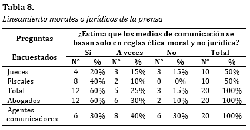Influence of the current of opinion in the preparatory investigation courts of the judicial district of San Martín.
DOI:
https://doi.org/10.51252/rcri.v4i1.580Keywords:
information, value judgments, parallel trials, presumption of innocence, pretrial detentionAbstract
It is undeniable the great influence that the media, press or communication agents have within the community, possessing even the power to exert pressure on the institutions of justice, so the research conducted aims to determine whether the current of opinion of the press influences the decision of judges of preparatory investigation in the application of pre-trial detention in the Judicial District of San Martin, analyzing how this influence is presented and whether these generate violations of fundamental rights. The methodology used was basic, descriptive-relational, non-experimental cross-sectional design, with a sample population of 10 judges, 10 prosecutors, 20 lawyers and 20 communication agents working in the Judicial District of San Martin. The observation technique was used, and a questionnaire was used as an instrument. The results show that 55% of the judges and prosecutors believe that they haven´t influence, 50% of the lawyers believe that they sometimes have influence, and 40% of the communication agents believe that they have influence. The conclusion is that there is a certain influence of the current of opinion on the judges in matters of pre-trial detention.
Downloads
References
Álvarez Yrala, E. O. (2020). Los juicios paralelos en los procesos penales y su afectación a los principios de independencia, imparcialidad y presunción de inocencia [Universidad de San Martín de Porres]. https://hdl.handle.net/20.500.12727/6945
Bahamonde, R. R. (2022). Presunción de Inocencia, Juicios Previos y Juicios Paralelos. Revista Internacional Consinter de Direito, 335–348. https://doi.org/10.19135/revista.consinter.00014.14
Barrero Ortega, A. (2022). Juicios paralelos y Constitución: su relación con el Periodismo. Revista Latina de Comunicación Social, 5(47). https://www.redalyc.org/pdf/819/81954704.pdf
Carvajal, J. (2021). Medios de comunicación y procesos judiciales: una mirada desde la jurisprudencia constitucional. Revista Republicana, 31, 145–163. https://doi.org/10.21017/Rev.Repub.2021.v31.a111
Castro Muñoz, J. J. (2023). La independencia judicial, los juicios de degradación y los juicios paralelos. Cuadernos De Derecho Penal, 24, 149–200. https://revistas.usergioarboleda.edu.co/index.php/cuadernos_de_derecho_penal/article/view/2596
Droguett González, C., & Walker Silva, N. (2020). El derecho a ser informado sobre los asuntos de interés público: defensa de los juicios paralelos en Chile. Problemas y soluciones. Revista Chilena de Derecho, 47(1), 33–56. https://doi.org/10.4067/S0718-34372020000100033
Francisco, J., & Leturia, I. (2018). La publicidad procesal y el derecho a la información frente a asuntos judiciales. Análisis general realizado desde la doctrina y jurisprudencia española. Revista Chilena de Derecho, 45(3), 647–673. https://doi.org/10.4067/S0718-34372018000300647
García-Perrote, E. (2015). Proceso penal y Juicios Paralelos [Universidad de Barcelona]. https://diposit.ub.edu/dspace/bitstream/2445/100449/1/MEGPF_TESIS.pdf
García Yépez, N. (2019). La incidencia de los medios de comunicación en la presunción de inocencia. Revista Cap Jurídica Central, 3(5), 141–177. https://doi.org/10.29166/cap.v3i5.2258
Gutiérrez Velásquez, A. J. (2016). La prisión preventiva ¿medida cautelar excepcional o medida represiva de aplicación general? [Univerdad de San Martín de Porres]. https://hdl.handle.net/20.500.12727/2374
Guzmán Fluja, V. C. (2018). Juicios paralelos en las redes sociales y proceso penal. IDP Revista de Internet Derecho y Política, 27. https://doi.org/10.7238/idp.v0i27.3148
Harbottle Quirós, F. (2017). Independencia Judicial y Juicios Penales Paralelos. ACADEMO, 4(1), 24. https://www.redalyc.org/articulo.oa?id=688273457012
Hernández Sampieri, R., Fernández Collado, C., & Baptista Lucio, P. (2014). Metodología de la investigación (6ta ed.). McGraw-Hill Education.
Jiménez Paneque, R. (1998). Metodología de la investigación: elementos básicos para la investigación clínica. Ciencias Médicas.
Montalvo Abiol, J. C. (2012). Los juicios paralelos en el proceso penal: ¿anomalía democrática o mal necesario? [Universidad Carlos III de Madrid]. http://universitas.idhbc.es/n16/16-06.pdf
Rodriguez Saavedra, S. P. (2017). Juicio paralelo en la prisión preventiva de los juzgados penales de la Corte Superior de Justicia de Lima - periodo 2016 [Universidad César Vallejo]. https://hdl.handle.net/20.500.12692/8103
San Miguel Caso, C. (2021). Los juicios paralelos en España: El efecto adverso de la libertad de información en la publicidad mediata. Revista Brasileira de Direito Processual Penal, 7(1), 443. https://doi.org/10.22197/rbdpp.v7i1.419
Sánchez Vega, K. L. (2019). El derecho de defensa y el despliegue mediatica, ¿los juicios se ganan en los medios o en los estrados judiciales? Revista SSIAS, 12(2), 1–9. https://revistas.uss.edu.pe/index.php/SSIAS/article/view/1152/979

Published
How to Cite
Issue
Section
License
Copyright (c) 2024 Martín Pinchi-Bartra

This work is licensed under a Creative Commons Attribution 4.0 International License.
The authors retain their rights:
a. The authors retain their trademark and patent rights, as well as any process or procedure described in the article.
b. The authors retain the right to share, copy, distribute, execute and publicly communicate the article published in the Ratio Iure Scientific Journal (RCRI) (for example, place it in an institutional repository or publish it in a book), with an acknowledgment of its initial publication in the RCRI.
c. Authors retain the right to make a subsequent publication of their work, to use the article or any part of it (for example: a compilation of their works, notes for conferences, thesis, or for a book), provided that they indicate the source of publication (authors of the work, journal, volume, number and date).






